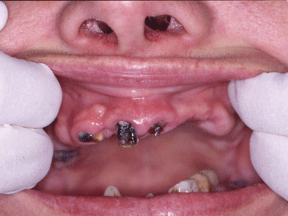 |
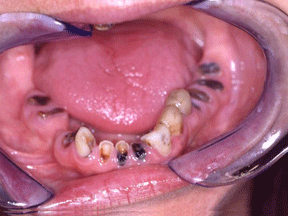 |
Photos of how meth has destroyed a person’s upper and lower teeth. |
“Looking back, I’m sure I encountered patients earlier than that who had methamphetamine addictions, but they wouldn’t admit it at the time,” said Dr. Jenkins, an associate professor in the department of adult restorative dentistry at the UNMC College of Dentistry in Lincoln.
Meth mouth is so dubbed because of the horribly disfigured condition of the drug abuser’s teeth and is being seen more frequently by dentists in private practice and at university dental clinics.
And while Dr. Jenkins didn’t know what he was encountering in the mid 1990s he did begin to notice a pattern.
The patient’s teeth were so decayed, fractured or both, that most or all of their teeth needed extensive dental work or had to be extracted.
Dr. Jenkins began to ask his patients what had happened to them that would cause such extensive damage.
Several told him they had taken the drug methamphetamine, a toxic drug that can include a mix of medicine from cold remedies (such as pseudo-ephedrine and ephedrine), battery acid, Drano and anhydrous ammonia to name a few.
The combination of the drug, the effects it has on the person using it and exposure to sugar leads to teeth that are often impossible to restore to health.
“In many cases I have no choice but to extract the remaining diseased teeth and fabricate upper and lower dentures,” Dr. Jenkins said.
Jenkins said he has had patients as young as 20 come to him with such pervasive destruction to their teeth that the patient has to have extractions and a full or partial set of dentures.
One of the side effects of methamphetamine use is a dry mouth. To alleviate this many addicts rely on caffeinated soda pops that also have high sugar content.
“The overwhelming favorite of most addicts is to drink Mountain Dew,” Dr. Jenkins said. “The soda pop helps to continue the buzz the addict is feeling. What the addict doesn’t realize is that while they are busy relieving their dry mouth symptoms with pop, their teeth, which would normally be somewhat protected by the saliva that washes away some of the decay-causing bacteria in their mouths, are under constant attack.”
Each 12-ounce can of soda pop contains 10 to 12 teaspoons of processed sugar, he said. The lack of saliva and high sugar consumption leads to the extensive decay we are now seeing in these people.
Another thing Dr. Jenkins has noticed in treating patients who use methamphetamines is that some have a tendency to grind their teeth, leading to a dramatic loss of tooth enamel. “This will also leave the teeth open to decay,” he said.
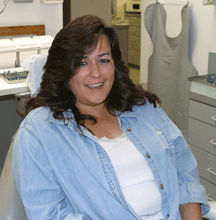 |
Bambi Smith has worked with UNMC’s Dr. Jenkins to salvage her teeth after using meth. |
Smith is a patient of Dr. Jenkins, who has worked with her to try to salvage what is left of her teeth.
“I was aware of what I was doing to my teeth, but I was also an addict and by the time you’re in the grips of meth you don’t care about anything but your next high,” said Smith, who has lost 20 of her teeth to meth. “It’s also a self-esteem issue, because you feel like ‘why do I deserve teeth, I’m just a junkie.’ ”
Smith said she was under the impression that she could just go to the dentist and have her teeth ‘fixed.’ “But by 1991, I knew, it was past the point of no return,” she said.
Smith was born in Denver, Colo., and abandoned at a hospital there. Before she was 2-years-old she was raped. By the time she was 3, Smith said she had developed severe mental and emotional problems that her adoptive parents were unaware of.
“I began sneaking drinks of my father’s whiskey and water when I was three. I began smoking pot at 8 and by the time I was 15 I was using heroin,” she said. “My teeth were in good shape then,” Smith said. “It didn’t even occur to me then that the drugs I used would have any impact on my teeth.”
She became an exotic dancer and soon found herself consumed by drugs and alcohol. “Drugs and alcohol were readily available and most of the girls would get high in the dressing room,” she says bluntly.
Over the next 20 years Smith would find herself married and divorced twice, in and out of the hospital for overdoses and homeless. One thing remained constant, though, her teeth ached day in and day out.
“The decay was a gradual process, just like the pain that accompanied it,” Smith said.
She sought treatment in the mid-80s from Dr. Jenkins, who removed 13 teeth at that time. But any attempts he made then to re-build the remaining 18 teeth were interrupted by Smith’s addiction.
Once again lost in the world of drugs, Smith paid little attention to the aching in her mouth. “I’d be at parties and watch people pull chunks of their teeth out of their mouths,” Smith said.
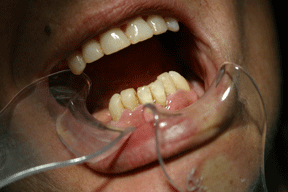 |
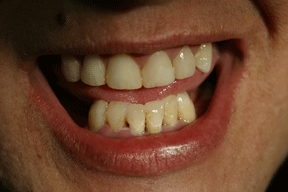 |
Top: Bambi Smith’s lower teeth before being restored (her upper teeth already have been restored). Bottom: Smith’s lower teeth after being restored. |
Finally in 2001, and in trouble with the law, Smith entered a life of recovery. She once again sought the help of Dr. Jenkins, who pulled six more teeth. It wasn’t until 2005 that Smith had the opportunity to return to Dr. Jenkins and by then the pain was excruciating.
“It was horrible,” she said. “It even hurt to bite down on a cheese puff.”
Smith had lost most of her teeth and Dr. Jenkins would only be able to rebuild the 12 in front. “I’m really grateful that God allowed me to keep the ones in front,” said Smith, who has been free from methamphetamine since 2001.
Medicaid covers the costs of the dental work.
After restoring Smith’s front teeth, Dr. Jenkins will fabricate upper and lower partial dentures for her. A small step in restoring her life.
In an effort to educate dental professionals and the public about methamphetamine and the effects it has on teeth, Dr. Jenkins has devised a seminar on the topic.
“We need to be able to recognize ‘meth mouth’ if presented with a patient who has that kind of tooth decay and symptoms, and help the patient as much as we can,” Dr. Jenkins said.
Dr. Jenkins has prepared a two-hour power-point seminar regarding methamphetamine use in patients. The seminar, titled: “Methamphetamine: Nothing to Meth Around With,” covers the history of methamphetamine, what it is, signs of drug use and symptoms to look for in patients that are suspected abusers.
He also covers cases he’s seen and appropriate treatments. “It’s important to try to save and restore any teeth that you can,” he said.
Dr. Jenkins has presented this seminar to dental students and professionals in private practice at the College of Dentistry and other continuing education meetings around the state.
“I’m glad I am able to help Bambi,” Dr. Jenkins said, “and educate other dentists about the dangers involved with the tragic abuse of this drug.”
Smith is glad Dr. Jenkins is educating other dentists as well. Not just about the drug and its affects but how to help restore any remaining teeth – an important aspect in one’s recovery.
“I’ve been to other dentists who just wanted to pull out all of my teeth and it makes me sad to think about all the other recovering addicts who have lost teeth because their dentist isn’t educated,” Smith said. “I’m fortunate I’m in a position to get my teeth fixed because when I’m at a 12-step meeting and smiling and someone comes in all snaggletooth it just might give them hope.”